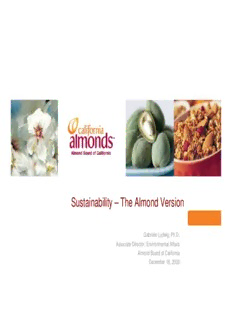
California Almonds PDF
Preview California Almonds
Sustainability – The Almond Version Gabriele Ludwig, Ph.D. Associate Director, Environmental Affairs Almond Board of California December 16, 2009 1 About the Almond Board of California Grower-enacted “Federal Marketing Order” established in 1950 • Represents growers and handlers (processors) Under the supervision of USDA Voluntary 10 member Board of Directors (5 growers, 5 handlers) • 16 committees and ~140 volunteer members Funded by $.03/lb assessment Provides: • Generic global marketing of almonds • Sets grade standards • Funds research in production, environmental issues, nutrition, and food safety/quality 2 Definitions of Sustainability 4-5th generation almond growers = long-term perspective Ecologically Economically Sound Viable Social Equity 3 Sustainability: The Almond Version The Almond Board through the Environmental Committee has been exploring the concept and what it means for almond growing for over 5 years. The definition of sustainable almond farming, developed through focus groups with almond farmers is: Sustainable almond farming utilizes production practices that are economically viable and are based upon scientific research, common sense and a respect for the environment, neighbors and employees. The result is a plentiful, healthy and safe food product. 4 Why Consider Sustainability? Rapidly changing regulations affecting resources and costs • Water availability • AB32 (Greenhouse Gas) - Energy • Irrigated Lands, etc – Water quality • PM10, Ozone, etc - Air 5 Why Consider Sustainability? Rapidly changing marketplace • Major purchasers of (food companies, retailers, food service) are asking about sustainability of suppliers 6 7 Why Consider Sustainability? 8 Social License Definition: The privilege of operating with minimal formalized restrictions (legislation, regulation, or market requirements) based on maintaining public trust by doing what’s right. Public Trust: A belief that activities are consistent with social expectations and the values of the community and other stakeholders. Source: Charlie Arnot (Center for Food Integrity) 9 The Social License To Operate Flexible Rigid Responsive Bureaucratic Lower Cost Higher Cost Social License Social Control • Ethics • Regulation • Values Tipping • Legislation Point • Expectations • Litigation •Self-Regulation Single triggering event • Compliance Cumulative impact High Trust Low Trust Complete Prohibition Autonomy Source: Charlie Arnot (Center for Food Integrity) 10
Description: